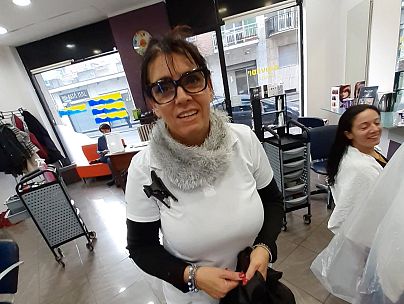COVID-19: Italian hairdressers angry as they remain under lockdown

As the month of May and the prospect of fewer restrictions neared, Italian hairdressers and beauticians got ready.
Masks, shoe covers, plexiglass barriers and sanitising machines were bought to prepare for the return of customers — an important investment for small business owners who’ve had to continue paying their rent or mortgage without any income stream for two months.
[contfnewc]
[contfnewc]
[contfnewc]
But their hopes were dashed when, unlike factories and other shops across the country, they were not allowed to reopen on May 4. Instead, they will have to wait until June 3.
‘Survival tax evasion’
When they do finally reopen their doors, business will definitely not be as usual.
Social distancing measures mean that salons will at most be able to welcome half the number of clients they previously did unless they lengthen their working days.
The situation for the whole sector whose 135,000 businesses employ about 260,000 people is therefore serious and many have expressed anger over the delay and what they perceive as a lack of assistance from the state.
[contfnewc]
Andrea Giovanardi, a lawyer and professor of tax law in Trento, criticised the executive’s decision to keep the sector closed on Twitter. A decision which, in his view, will encourage “survival tax evasion”.
He said for instance that the government should have taken a more geographically-targeted approach, allowing hair and beauty salons in areas least impacted by the pandemic to reopen. He also argued that the delay will boost illegal trade with some barbers and beauticians forced to make undeclared house visits to make ends meet.
“Shops able to guarantee health security should be allowed to reopen. If the government prevents people from working, the alternative for them will be to turn to illegality,” Giovanardi told Euronews.
We asked five hairdressers to tell us about their personal situation as one in three salons is now threatened.
‘State allowing abusers to work’

[contfnewc]
[contfnewc]
[contfnewc]
[contfnewc]
Marsela Pupa, 35, from Bassano del Grappa, has also had to cancel courses and seminars she gives.
She considers herself lucky though because her landlord has agreed for her to pay half the rent for the months she was forced to be closed.
But she is furious at those who work from home. “Those who work illegally at home are making even more money, while we are closed”.
“Here in Italy we have very high hygiene and safety standards. The state is allowing abusers to work at home and keeping the salons closed even though we have health checks and the ASL (Local Health Unit) can present itself at any moment,” she added.
‘They must do it for their family’
Giuseppe Amatulli, 37, works in Bari.

[contfnewc]
[contfnewc]
[contfnewc]
[contfnewc]
“The biggest problem is the rent: we continue to pay it at full price. In addition, there is the problem of illegal jobs. With my colleagues, we note that between 50% and 60% of people already have their hair cut,” he said.
“Therefore, at the reopening, we will not have so much work to compensate for the lost months. What is the use of keeping the premises that can comply with hygiene rules closed if others make house calls?”
“These old jackals who cut hair at home have now taken our customers too. If before 30% had their hair cut at home and 70% came to salons, now house calls account for around 60% of cases.
“There are few of us professionals. I have heard of colleagues with a VAT number who have told me that they must eat, they must do it for their family.
“When customers also have less money to spend, illegal activity will go up because it will cost less,” he also said.
‘Debt piling on debt’

[contfnewc]
[contfnewc]
[contfnewc]
[contfnewc]
Tullia Cutini, 49, works from Foligno in Umbria, a central region that has recorded 70 COVID-19 deaths.
“How can we have the same reopening rules (as Lombardy where 70,000 deaths were recorded)?,” she questioned.
“I’ve already gone to the bank for a loan. I don’t know when it will come but it’s debt piling on other debt,” she decried.
“I have a mortgage on the place which was not suspended because I took it in my name and not as a company. In addition, I have my two employees’ salaries and the redundancy funds have not arrived. I’m running out of income,” she stressed.
‘Beauty does not stop’
Cristina Pagani, 50, employs four people in her salon in Conselice, in the north-eastern province of Ravenna. She is also in a hurry to reopen but only when the risk of contagion is low.
“We must realise that the only difference between this situation and a war with bombs … is that we don’t hear the bombs. We still bury the dead. The activities are closed, but they are standing there waiting. Our parents waged two wars, think if we also had to rebuild,” she added.
“Beauty does not stop, from this point of view we are lucky. It is important to feel good with ourselves. There are people out there who, in this period, would do everything to feel good. We receive requests and even threats, offers of higher fees to make house calls. I don’t do it ethically, but I deliver some product.
“I expect having to halve my customers when I reopen due to restrictions. Before we had a schedule that allowed us to have a life, now what we did in seven and a half hours will only be achievable if we extend the workday. My shift as owner will be 12-hour-long,” she explained.
‘We don’t ask for much’

[contfnewc]
[contfnewc]
[contfnewc]
[contfnewc]
Giuseppina Foti, 54, from Turin also had the good fortune of a sympathetic landlord who suspended her rent. But she’s been unable to pay her two employees who both have children.
“When we reopen, we will have to bring in fewer customers and all our wages will be lower. I have already bought everything — masks, disposable kimono, sanitiser — but I struggled to find all the essentials and so I paid a lot more than before,” she told Euronews.
“There are shops with owners of a certain age, surely it will be hard for them. If I am already struggling with half of the customers, they will close. I have also asked for a loan, we are in difficulty.



